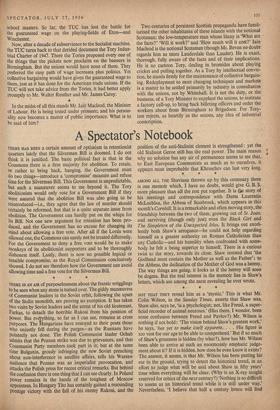THERE IS AN AIR of purposelessness about the frantic wrigglings
to be seen when any stone is turned over. The giddy manoeuvres of Communist leaders in the Soviet orbit, following the upset of the Stalin monolith, are proving no exception. It has taken two visits by Soviet leaders and the arrest of his old lieutenant, Parkas, to detach the horrible Rakosi from his position of Power. But everything, so far as I can see, remains at cross Purposes. The tlungarians have restored to their posts those Who unjustly fell during the purges—as the Russians have Pointedly not done. The Polish Communist leader Ochab admits that the Poznan strike was due to grievances, and that Communist Party members took part in it; but at the same time Bulganin, grossly infringing the new Soviet preaching about non-interference in satellite affairs, tells his Warsaw audience that Poznan was an imperialist provocation, and attacks the Polish press for recent critical remarks. But behind the confusion there is one thing that I can see clearly. In Poland Power remains in the hands of the toughest of Moscow appointees. In Hungary Tito has certainly gained a resounding Prestige victory with the fall of his enemy Rakosi, and the position of the anti-Stalinist element is strengthened : yet the old Stalinist Geroe still has the Teal power. The main reason why no solution has any air of permanence seems to me that, to East European Communists as much as to ourselves, it appears most improbable that Khruschev can last very long.


































 Previous page
Previous page